新冀教版七年级英语32导学案
- 格式:doc
- 大小:36.00 KB
- 文档页数:4
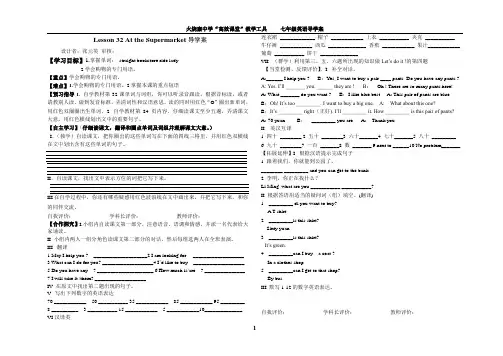
Lesson 32 At the Supermarket导学案设计者:张元英审核:【学习目标】1.掌握单词:straight bookstore ride lady2.学会购物的专门用语。
【重点】学会购物的专门用语。
【难点】1.学会购物的专门用语。
2.掌握本课的重点短语【预习指导1.自学教材第32课单词与词组,你可以听录音跟读,根据音标读,或者请教别人读。
做到发音标准,弄清词性和汉语意思。
读的同时用红色“O”圈出新单词,用红色双圈圈出生单词。
2. 自学教材第84 页内容,仔细读课文至少五遍,弄清课文大意。
用红色横线划出文中的重要句子。
【自主学习】(仔细读课文,翻译和圈点单词及词组并理解课文大意。
)I.(独学)自读课文,把你圈出的这些单词写在下面的四线三格里,并用红色双横线在文中划出含有这些单词的句子。
II.自读课文,找出文中表示方位的词把它写下来。
III.在自学过程中,你还有哪些疑惑用红色波浪线在文中画出来,并把它写下来,和你的同伴交流。
自我评价:学科长评价:教师评价:【合作探究】I.小组内自读课文第一部分,注意语音、语调和情感,并派一名代表给大家诵读。
II .小组内两人一组分角色读课文第二部分的对话,然后每组选两人在全班表演。
III. 翻译1 May I help you ? ____________________2 I am looking for ... ___________________3 What can I do for you? ___________________4 I’d like to buy ...___________________5 Do you have any ...? _____________________6 How much is/are ...? _______________7 I will take it /them? ___________________IV 在原文中找出第二题出现的句子。
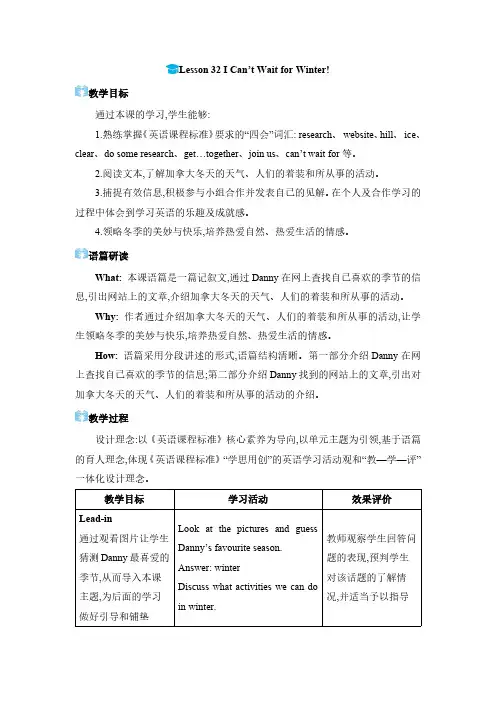
Lesson32I Can’t Wait for Winter!教学目标通过本课的学习,学生能够:1.熟练掌握《英语课程标准》要求的“四会”词汇:research、website、hill、ice、clear、do some research、get…together、join us、can’t wait for等。
2.阅读文本,了解加拿大冬天的天气、人们的着装和所从事的活动。
3.捕捉有效信息,积极参与小组合作并发表自己的见解。
在个人及合作学习的过程中体会到学习英语的乐趣及成就感。
4.领略冬季的美妙与快乐,培养热爱自然、热爱生活的情感。
语篇研读What:本课语篇是一篇记叙文,通过Danny在网上查找自己喜欢的季节的信息,引出网站上的文章,介绍加拿大冬天的天气、人们的着装和所从事的活动。
Why:作者通过介绍加拿大冬天的天气、人们的着装和所从事的活动,让学生领略冬季的美妙与快乐,培养热爱自然、热爱生活的情感。
How:语篇采用分段讲述的形式,语篇结构清晰。
第一部分介绍Danny在网上查找自己喜欢的季节的信息;第二部分介绍Danny找到的网站上的文章,引出对加拿大冬天的天气、人们的着装和所从事的活动的介绍。
教学过程设计理念:以《英语课程标准》核心素养为导向,以单元主题为引领,基于语篇的育人理念,体现《英语课程标准》“学思用创”的英语学习活动观和“教—学—评”一体化设计理念。
教学目标学习活动效果评价Lead-in通过观看图片让学生猜测Danny最喜爱的季节,从而导入本课主题,为后面的学习做好引导和铺垫Look at the pictures and guessDanny’s favourite season.Answer:winterDiscuss what activities we can doin winter.教师观察学生回答问题的表现,预判学生对该话题的了解情况,并适当予以指导设计意图图片导入本课主题,展示冬季人们经常参加的一些有趣的活动,激发学生的学习兴趣。
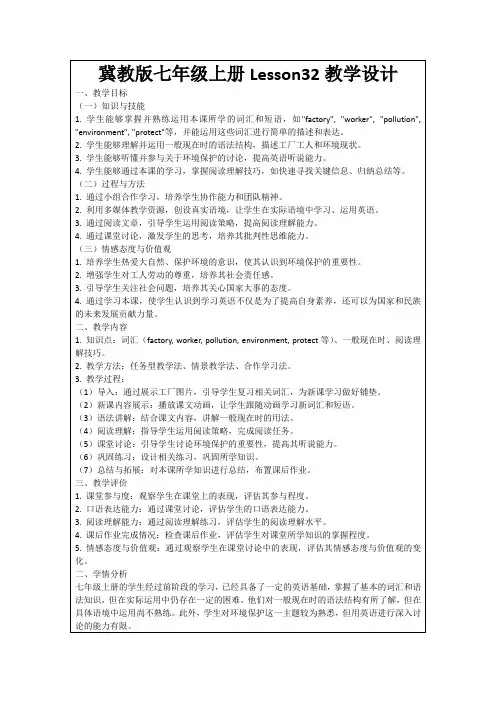
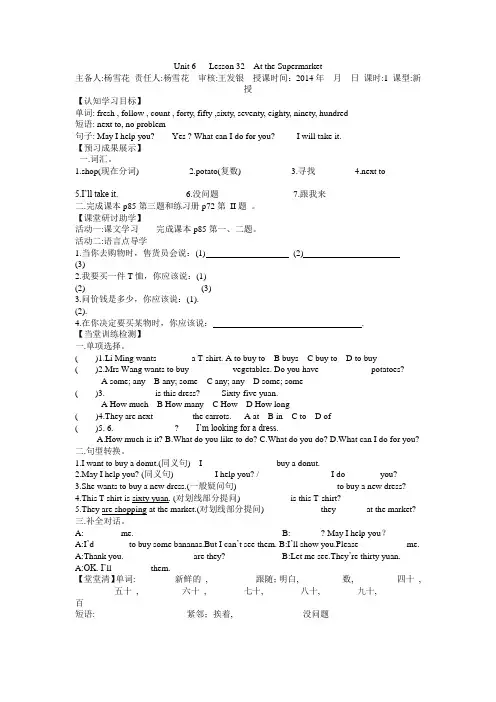
Unit 6 Lesson 32 At the Supermarket主备人:杨雪花责任人:杨雪花审核:王发银授课时间:2014年月日课时:1 课型:新授【认知学习目标】单词: fresh , follow , count , forty, fifty ,sixty, seventy, eighty, ninety, hundred短语: next to, no problem句子: May I help you? Yes ? What can I do for you? I will take it.【预习成果展示】一.词汇。
1.shop(现在分词) _________2.potato(复数) _________3.寻找_________4.next to_________5.I’ll take it. ____________6.没问题_____________7.跟我来____________二.完成课本p85第三题和练习册p72第II题。
【课堂研讨助学】活动一:课文学习完成课本p85第一、二题。
活动二:语言点导学1.当你去购物时,售货员会说:(1) (2)(3)____________________________________2.我要买一件T恤,你应该说:(1) ________________________________________(2)__________________________ (3) ________________________________________3.问价钱是多少,你应该说:(1).________________________(2).__________________________4.在你决定要买某物时,你应该说:_____________ .【当堂训练检测】一.单项选择。
( )1.Li Ming wants _______ a T-shirt. A to buy to B buys C buy to D to buy( )2.Mrs Wang wants to buy _________ vegetables. Do you have ___________ potatoes?A some; anyB any; someC any; anyD some; some( )3.---_________ is this dress? ---Sixty-five yuan.A How muchB How manyC HowD How long( )4.They are next ________ the carrots. A at B in C to D of( )5. 6.---____________? ---I’m looking for a dress.A.How much is it?B.What do you like to do?C.What do you do?D.What can I do for you?二.句型转换。
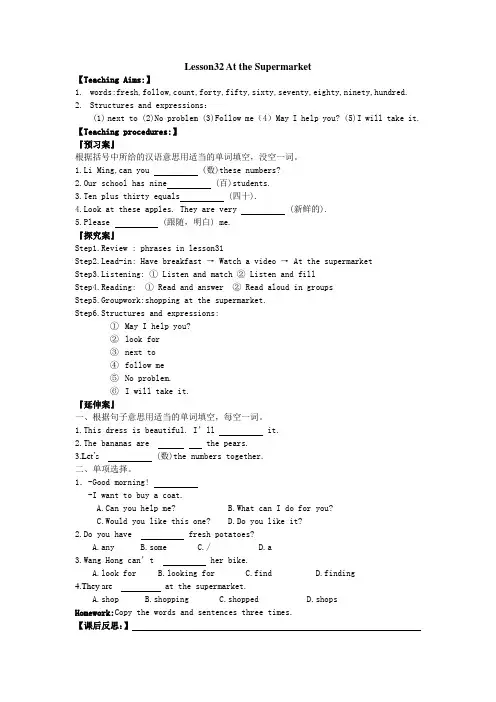
Lesson32 At the Supermarket【Teaching Aims:】1.words:fresh,follow,count,forty,fifty,sixty,seventy,eighty,ninety,hundred.2.Structures and expressions:(1)next to (2)No problem (3)Follow me(4)May I help you? (5)I will take it. 【Teaching procedures:】『预习案』根据括号中所给的汉语意思用适当的单词填空,没空一词。
1.Li Ming,can you (数)these numbers?2.Our school has nine (百)students.3.Ten plus thirty equals (四十).4.Look at these apples. They are very (新鲜的).5.Please (跟随,明白) me.『探究案』Step1.Review : phrases in lesson31Step2.Lead-in: Have breakfast → Watch a video → At the supermarketStep3.Listening: ① Listen and match ② Listen and fillStep4.Reading: ① Read and answer ② Read aloud in groupsStep5.Groupwork:shopping at the supermarket.Step6.Structures and expressions:①May I help you?②look for③next to④follow me⑤No problem.⑥I will take it.『延伸案』一、根据句子意思用适当的单词填空,每空一词。
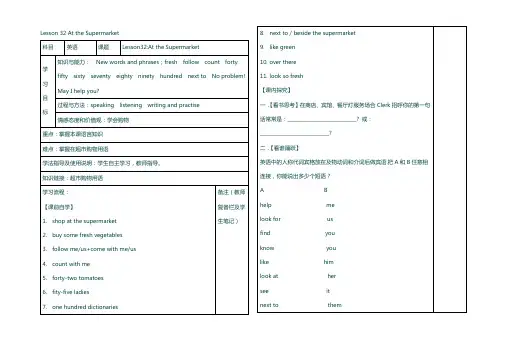
Lesson 32 At the Supermarket写作 学习改写教学过程教学反思Unit 2Room单元教材分析:第二单元主要学习关于房间的四个单词:bed, light, door, box, 初步学习方位介词behind,near复习in,on,under;简单的交际用语:What’s behind the door?A chair.字母E, F, G, H。
通过描述自己房间里的物品,表达出物品所在的位置,初步学会布置一个整洁的家庭环境,有一个整体的审美体验。
单元教学目标:1、语言技能目标(1)能够听懂、会说与房间有关的四个词汇:light, bed, door, box,以及两个表达位置的词汇:near, behind。
(2)能够听懂、会说询问在某个位置有什么物品的功能句及回答:What’s behind/near/…? A chair/bird/…,并能在恰当的情境中初步运用。
(3)能够听懂简短的课堂指令语,并作出相应的反应。
(4)能够借助日常生活图片识别、会说大写英文字母E、F、G、H。
2、情感目标(1)能够跟随录音大胆模仿说唱歌曲和歌谣。
(2)通过本单元的智力游戏,培养学生一定的观察能力和逻辑推理能力。
单元教学重点:与房间有关的四个词汇:bed, light, door, box;以及两个表达物品位置的介词:near, behind。
单元教学难点:句型What’s behind/near/…? A chair/bird/…的使用。
单元课时安排:五课时第一课时教学目标:能在一定场景下听懂、会说与房间有关的四个词汇:bed, light, door, box, 以及两个表示位置的词汇:near, behind。
教学重难点:1、4个有关房间的单词的读音和图形。
2、要求学生能将读音和图形联系起来。
教学准备:光盘,单词卡片教学时间:年月日教学过程:一、复习1、Listen and do. 教师发指令:Put your ruler under your desk. Put your pencil in your schoolbag.等,学生根据指令做动作。

Unit6 lesson32导学案课题授课时间主备人授课人班级审核人阶段环节教学过程师生活动课后反思第一阶段预学案目标导航教学目标:1 掌握单词research,website,hill,ice,clear2 让学生了解如何在网上查阅天气信息3让学生学习如何讲述自己上网查阅天气信息学生课前预习时明确教学目标及重难点学生根据预学案进行课前预习学生对自己的预习进行简单的测试教师对学生预习情况的反馈教学重难点:1.正确表达天气2学习一些用于介绍天气的句式Winter here are really cold!Winter is the best season!What a cold,snowy day!自主预习预习自测1.自学单词2..熟读课文,把握其意,画出不理解处,小组之间交流,弄懂文意。
Ⅰ. 选词配图fire, website, ice, snowman,hills第二阶段教学案预习反馈:2mins合作探究10mins交流展示:8min s精讲点拨:10minsⅡ. 句型展示1. 你甚至可以和家人一起堆雪人。
You can even get the family together and ____________ ______.2. 在温暖的火旁享受一个晴朗、寒冷的夜晚。
Enjoy a ______, cold night ______ a warm fire.3. 对于冬我有点迫不及待了。
I ______ ______ ______ winter.4. 我将享受一段美好的时光!I’m ______ ______ have a great time!自学单词1.自读课文,结合教学重难点划出文中的短语和句型,熟读背诵2.完成课后第.一,二。
三,四题【探究总结】research的用法(1)research可与不定冠词连用,也可以用复数形式,但通常不与many或数字连用。
(2)research后常跟介词on,into或for【学以致用】①这是市场调查报告。
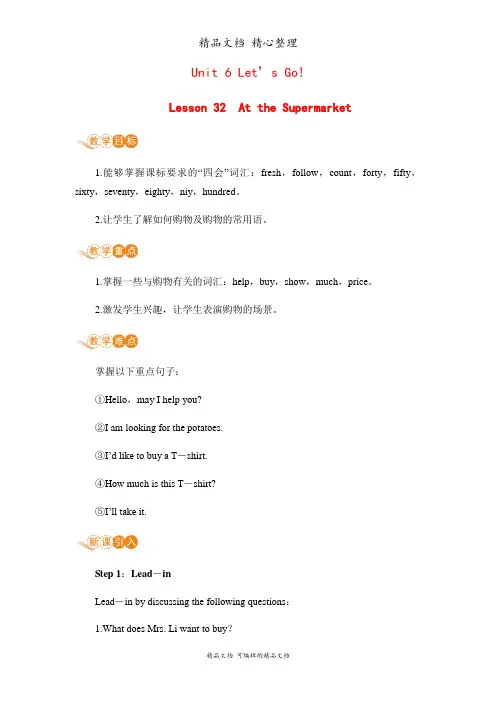
Unit 6 Let’s Go!Lesson 32 At the Supermarket1.能够掌握课标要求的“四会”词汇:fresh,follow,count,forty,fifty,sixty,seventy,eighty,niy,hundred。
2.让学生了解如何购物及购物的常用语。
1.掌握一些与购物有关的词汇:help,buy,show,much,price。
2.激发学生兴趣,让学生表演购物的场景。
掌握以下重点句子:①Hello,may I help you?②I am looking for the potatoes.③I’d like to buy a T-shirt.④How much is this T-shirt?⑤I’ll take it.Step 1:Lead-inLead-in by discussing the following questions:1.What does Mrs. Li want to buy?2.What colour does Li Ming like?3.How much is the T-shirt?Show the slides of shopping. Let the students discuss the questions in groups. Then present their results in front of the class. The styles can be dialogues or reports.Step 2:ListeningListen to the tape and fill in the blanks with the words you hear.1.The potatoes are next to the________.2.The red T-shirts are________.Finish the task in class orally.Step 3:ReadingRead the lesson and answer the following questions:1.What does Li Ming want to buy?2.Does Li Ming like green?Finish the task in class orally.Step 4:PracticeMake sentences with the language points:1.look forS1:I’m looking for my lost ruler.2.how muchS2:How much are these clothes?Step 5:ActivitiesAsk the students to introduce their shopping in groups. At the same time,the teacher can walk around the classroom to see if they have any questions.Discuss for a while,and then let some students e to the front to show their introductions.Step 6:e to “Let’s Do It!”Read the lesson again,and ask the students to do Exercises 1—2 in class.Ask the students to work in groups and learn from their classmates. Discuss for a while.Questions for you:1.Where do you often buy vegetables?2.What do you say to the waiter?Finish Exercises 3—4 in “Let’s Do It!”.。
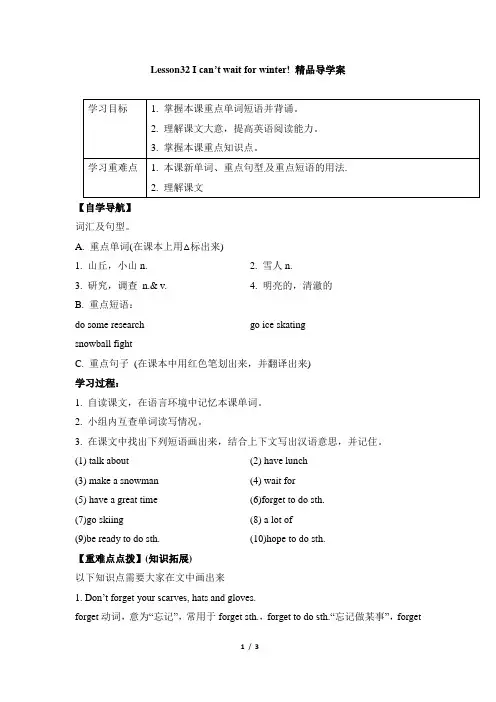
Lesson32 I can’t wait for winter! 精品导学案学习目标 1. 掌握本课重点单词短语并背诵。
2. 理解课文大意,提高英语阅读能力。
3. 掌握本课重点知识点。
学习重难点 1. 本课新单词、重点句型及重点短语的用法.2. 理解课文【自学导航】词汇及句型。
A. 重点单词(在课本上用△标出来)1. 山丘,小山n._______2. 雪人n. ________3. 研究,调查n.& v.__________4. 明亮的,清澈的__________B. 重点短语:do some research ________ go ice skating ________snowball fight ________C. 重点句子(在课本中用红色笔划出来,并翻译出来)学习过程:1. 自读课文,在语言环境中记忆本课单词。
2. 小组内互查单词读写情况。
3. 在课文中找出下列短语画出来,结合上下文写出汉语意思,并记住。
(1) talk about__________ (2) have lunch__________(3) make a snowman__________ (4) wait for__________(5) have a great time__________ (6)forget to do sth.__________(7)go skiing__________ (8) a lot of__________(9)be ready to do sth.__________ (10)hope to do sth.__________________ 【重难点点拨】(知识拓展)以下知识点需要大家在文中画出来1. Don’t forget your scarves, hats and gloves.forget动词,意为“忘记”,常用于forget sth.,forget to do sth.“忘记做某事”,forgetdoing sth“忘记做过某事”—Don’t forget ______ your homework. John.—Ok. I’ll do it right now.A. doingB. doC. to doD. does2. In the evening, you can join us inside for dinner.join动词,意为“加入”join与take part in的区别如下:join指参加某一党派,团体,组织并成为其中一员,take part in指参加某项活动并在其中起积极作用。
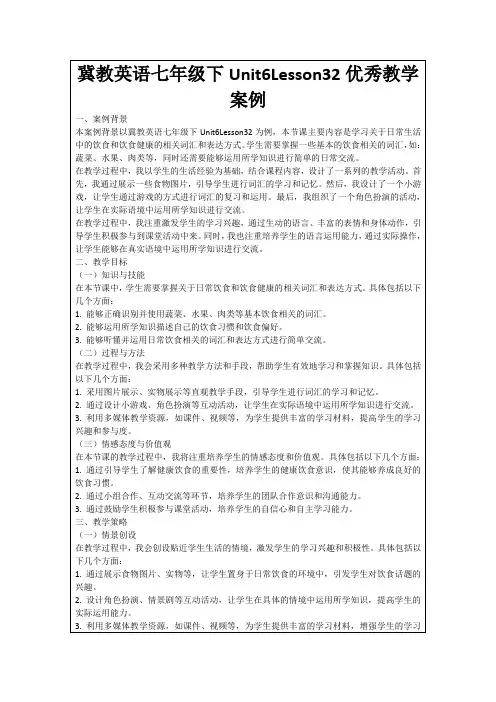
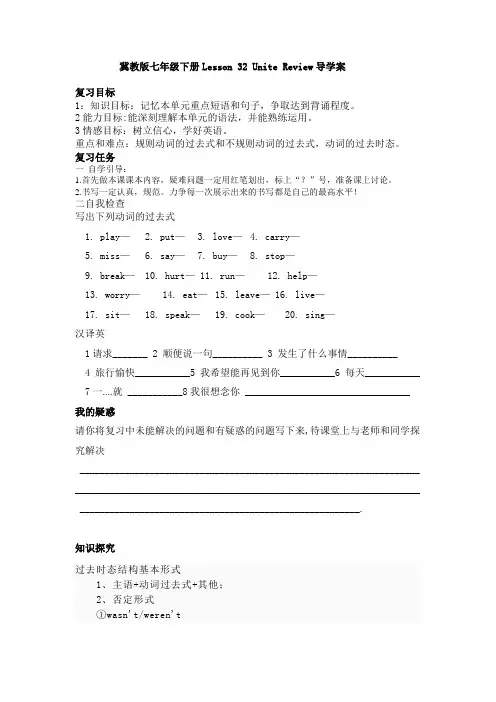
冀教版七年级下册Lesson 32 Unite Review导学案复习目标1:知识目标:记忆本单元重点短语和句子,争取达到背诵程度。
2能力目标:能深刻理解本单元的语法,并能熟练运用。
3情感目标:树立信心,学好英语。
重点和难点:规则动词的过去式和不规则动词的过去式,动词的过去时态。
复习任务一自学引导:1.首先做本课课本内容,疑难问题一定用红笔划出,标上“?”号,准备课上讨论。
2.书写一定认真,规范。
力争每一次展示出来的书写都是自己的最高水平!二自我检查写出下列动词的过去式1. play—2. put—3. love—4. carry—5. miss—6. say—7. buy—8. stop—9. break— 10. hurt— 11. run—12. help—13. worry—14. eat—15. leave— 16. live—17. sit—18. speak—19. cook—20. sing—汉译英1请求_______ 2 顺便说一句__________ 3 发生了什么事情__________4 旅行愉快___________5 我希望能再见到你___________6 每天___________ 7一....就 ___________8我很想念你 _________________________________ 我的疑惑请你将复习中未能解决的问题和有疑惑的问题写下来,待课堂上与老师和同学探究解决____________________________________________________________________ _____________________________________________________________________ ________________________________________________________.知识探究过去时态结构基本形式1、主语+动词过去式+其他;2、否定形式①wasn't/weren't②在行为动词前加didn't,同时还原行为动词;一般疑问句Did+主语+do+其他。
冀教版七年级英语上册导学案班级_________姓名____________Unit 6 Lesson 32 : At the Supermarket一、目标学习和词汇展示二、自主预习展示A英汉互译:1.May I help you?_______2.look for ______3.next to ________4.No problem________5.I’ll take it.________________6.How much is this T-shirt?_______________________________B.根据汉语意思和句意完成句子。
1.I like the ______(新鲜的)vegetables very much.2. _______(跟随) me, please.3.Can you ______(数) from ________ (十四) to _______ (四十)?4.I’m hungry.I want something___(eat)三、合作探究探究1).Yes,ple ase. I’m looking for the tomatoes.是的。
我在找土豆. look for 寻找I can’t find my bike.But I am looking for it everywhere.Can you help me___(寻找)my bike?探究2). They are next to the carrots.next to 意为“紧邻;挨着”,比near的距离更近一些。
例如:The apples are next to the oranges. 他坐在我旁边。
He sits ____ ____ me.探究3)I will show you.我带你去看看. show动词是“指示,带路”;show sb sth=show sth. to sb.Eg: Please show me your photos=Please show your photos_____.探究4).I’ll take it. 我买了。
Lesson 32:At the Supermarket !教学目标:1.掌握本课出现的新单词: fresh follow count forty fifty sixty seventy eighty ninety hundred2.通过大声朗读和小组合作探究掌握购物、询问价格的句型,提升语言表达能力。
课前预习:1.背诵本课的单词2.阅读并翻译课文,划出自己不懂得句子。
课内检测教师根据自己的需要检查单词的背诵情况合作探究1.同学们,你们能根据所给数字举一反三写出其它数字吗?21:twenty-one 14 , 18 , 32 , 45 , 56 , 69 , 71 , 83, 97 , 1002.结合课本85页的图片进行以下对话练习:A: Hello , can I help you ? B: I would like to ---A: They are over there B: How much is it / are they ?A: It’s / They are --- B: Ok . I will take it / them . Thank you .A: You’re welcome3.读课文,回答下列问题:1). Where are Li Ming and his mum ? 2). How much is the red T –shirt ?3). Where does Li Ming’s mother want to buy ?4.同学们,小组合作分角色读一读对话吧,然后将书合上,你能写出下列短语或句子吗?1). 我可以帮助你吗?___________ / ___________ 2). 寻找______ 3). 紧挨着______ 4). 请跟我来_______ 5). 我将指给你________6). 在那边_______ 7). 我买了__________ 8). 想买______ / _______巩固练习:一.句型转换 1. May I help you ? (同义句) ________2. I like red . (否定句) I ____ ____ red .3. I have some books . (一般疑问句) _____ you _____ _____ books ?4. He has some pens . (一般疑问句) _____ he _____ _____ pens .5. This dress is 70 yuan . _____ ______ is this dress ?6. Li Ming wants to buy a red coat.(同义句)Li Ming ___ ____ to buy a red coat.7. How much is this book ? (同义句) _____ _____ ____ this book ?8. She is reading the book . (对划线部分提问) ____ ____ she ______ ?9. You’re welcome .(同义句)______ .二.补全对话A: ____ ____ . B . Yes ? ____ can I do ____ you ?A: I am ____ _____ the potatoes . I can’t ____ them .B: They are ___ ____ the tomatoes . I’ll ____ youA: I ___ ___ to buy some apples , too . B: They’re ___ ____ . Please ____ ___.A: ___ ___ are apples ? B: Three yuanA: OK . I’ll ____ them . Here is the money . B: ____ ____ . A: No problem .。
Unit 6 Seasons Lesson 32 I Can't Wait for Winter Teaching goals 教学目标1. Target language 目标语言a. 掌握词汇及短语research website hill ice snowman cleardo some research in the mountains really cold world -class restaurant make a snowman can ,t wait forhave a great time句型1.I , m doing some research for my report about my favourite season.2.I can ,t wait for winter!3.I ,m going to have a great time!Learn something about winter.Ability goals 能力目标Enable students grasp some words about winter features.3. Learning ability goals 学能目标Some activities in winterTeaching important and difficult points 教学重难点Teach the student to learn the following expressions:I can't ……Teaching methods教学方法Listening and speaking.Teaching aids 教具准备Audiotape.Teaching procedures & ways 教学步骤与方式Step I Greeting and lead -inGreet the students and get them to review what they learned from the former text.Lead in the new text.1. Listen to the tape and learn about the contents of lesson thirty -two..Listen to the tape and try to finish the exercise 1 from "Let ,s Do it〞.2. Listen to the passage again and finish the exercise 2 from "Let ,s Do It〞.3. Grasp the important phrases and sentences of the text.Phrases:do some research 做调查in the mountains 在山里really cold 确实很冷world -class restaurant 世|界级||饭店make a snowman 堆雪人can ,t wait for 迫不及待have a great time 玩的开心 ,玩的愉快Sentences:1 )I can ,t wait for winter!can't wait for sth 不能等待……can't wait to do sth不能等待做某事;迫不及待地要求做某事.没有can't wait doing sth例句: I can't wait for you 我不能等你 .I can't wait to watch TV 我等不及去看电视2 )I , m doing some research for my report about my favourite season.research n. 研究 ,追究 vt. 从事…的研究 ,为…而做研究do some research for sth 为……做研究例句:I will do some research for my travel.do some research about sth 对……做研究例句:Once upon a time, a London journalist wanted to do some research about wine shops.从前 ,伦敦有位记者想对酒店作些调查研究 .Finish the exercise 3 from "Let ,s Do It〞 .Step III Work in pairs and finish the exercise 4 from "Let ,s Do It〞Homeworka. Finish the exercises in Activity book.b. Preview Lesson 33 and write down what you will do when winter comes.。
第四单元检测(时间:45分钟满分:100分)一根据局意及中文提示写单词或词组(5)1 My father likes listening to CCTV (消息).2 Did you 收到)Brian’s e-mail.3 How many (月) are there in a year?4 I’ll tell her your idea (一……就…..)I see her.5 Andrew (请求) a sick leave and went home二、单项选择。
(15)( ) 1---_____ is it from Beijing to Shijiazhuang? ---About 278 kilometres.A How longB How manyC How muchD How far( ) 2--- Would you like a cup of tea? ---________.A OkB Yes,thanksC Yes, pleaseD No, I don’t( ) 3 They ___ a great time at the birthday party yesterday.A are havingB haveC hasD had( ) 4---_____ are these shoes? ---Forty-five dollars.A How farB How muchC How bigD How many( ) 5 Look! The cloud ____ a donut.A looks atB look outC likesD looks like( ) 6 ---What ____ to do this Sunday afternoon? --- Go shopping.A do you goB did youC will youD are you going( ) 7 You ____ to get more exercise for a healthy body.A wantB needC likeD may( ) 8 I want to buy a book my mother.A toB forC withD give( ) 9 I want to go _____ a trip to Beijing this summer.A withB inC toD on( ) 10 ---_____ do you send a letter to your mother? ---Once a week.A How longB How farC How muchD How often( ) 11. The boy is TV.A. watchB. watchingC. seeD. seeing( ) 12.I took many ___Last week.A. pictureB. picturesC. photoD. a picture( ) 13 This __ last sunday.A happenB happenedC happeningD to happen( ) 14 _____ you ____ a new hat yesterday?A Do ;buyB Did;boughtC Didn ;buyD did ;buy( ) 15 Did you have fun ____ the game?A watchB watchingC watchedD to watch三、阅读理解。
Lesson 32:At the Supermarket
I.短语翻译。
1.在超市2.一些新鲜蔬菜
3.寻找4.靠近
5.没问题6.跟我来
Ⅱ.将上下对应的数字连线。
50 sixty
40 forty
70 one hundred
60 seventy
90 eighty
80 ninety
100 fifty
新课导学:
探究一I’ll show you.我带你去。
I’11 show you.是日常生活中常用的句子。
当对方需要找人或东西时,你主动帮忙时就说I’11 show you.,在超市、商店更常用。
show这时的意思是“带领,引导,指出”。
Show him the way.给他指路。
Show the foreign guests round the city.带领外国客人游览城市。
【例l】Please me your photo of your family。
A.show B.see
C.watch D.look at
【解析】该句表示“把你的家庭照片给我看看。
”正适合于show sb.sth.这一句型。
而see表示“看见”;watch表示“观看”;look at表示“看……”,都不符合题意。
【答案】 A
探究二 1 will take it.我将买下它。
动词take在本句中意为“买”,后可接名词或代词作宾语。
在商店里决定购
买某物时,常说I’ll take it或I’ll take them.,通常不用动词buy。
决定暂时不买时,常说I’ll think about it.意思是“我再想想”。
--Do you like the red skirt?你喜欢这件红短裙吗?
--Yes.I’11 take it.是的,我要买它。
【例2】I like donuts verymuch.I’ll five
A.eats B.has
C.1ike D.take
【答案】D
课堂检测
知识点一:Can/May l help you?的用法
1.--
--Yes,1 want to buy a schoolbag.
A.What are you doing?
B.May I help you?
C. Let me help you.
D.Can you help me?
2.Can I help you?(写出同义句)
I do for you?
知识点二:show的用法
3.Who can show to the bus stop?
A.I the way B.the way to I
C.me the way D.the way to me
知识点三:take的用法
4.这件大衣不是很贵,我买下了。
The coat is not too expensive.I’ll it.
作业:
Ⅰ.单项选择。
1.-- ?
--Yes, I’d like a pen.
A.Can I help you
B.What are you doing
C.What do you want to buy
D.What do you like
2.--Good morning,sir! May I help you?
-- .I’m just having a look.A.Yes,please
B.Good idea
C.No,thank you
D.I want something to drink
3.Let’s go to the department store a toy.A.buy B.to buy
C.buys D.buying
4.Let’s go to the restaurant lunch.
A.to have B.and has
C.have D.to has
5.-- for one donut?
--One yuan..
A.How many B.How much
C.What D.How
6.The dress is very expensive,I’ll buy it.A.or B.but
C.and D.because
Ⅱ.句型转换。
1.We want to buy two dresses.(改为一般疑问句)
want to buy two dresses’?
2.Do you like this dress?(用否定回答)
, .
3.Let me show you my new watch.(写出同义句)
Let me show you.
Ⅲ.阅读理解。
One Sunday morning,Mr.Green and his child,Bill are in a big shop.Mr.Green wants to buy a newblouse for Mrs.Green.nill likes oranges,So his father buys two kilos(公斤)of oranges for him.Bill wants to buy some picture—books and colour pencils,too.There are many people in the shop.They aremen and women,old and young.They all want to buy something there.
1.Mr.Green goes to the shop with
A.Mrs.Green B.his son
C.his daughter D.his father
2.Mr.Green wants to buy a new blouse for
A.Bill’s mother B.Bill
C.his friend D.other people
3.Bill likes
A.all the things B.the new blouse
C.oranges D.orange
4.Bill wants to buy
A.some picture—books
B.some color pencils
C.clothes in the shop
D.A and B
5.The shop is .
A.empty(空的) B.close(关闭的)
C.full of children D.full of people
教学反思:。